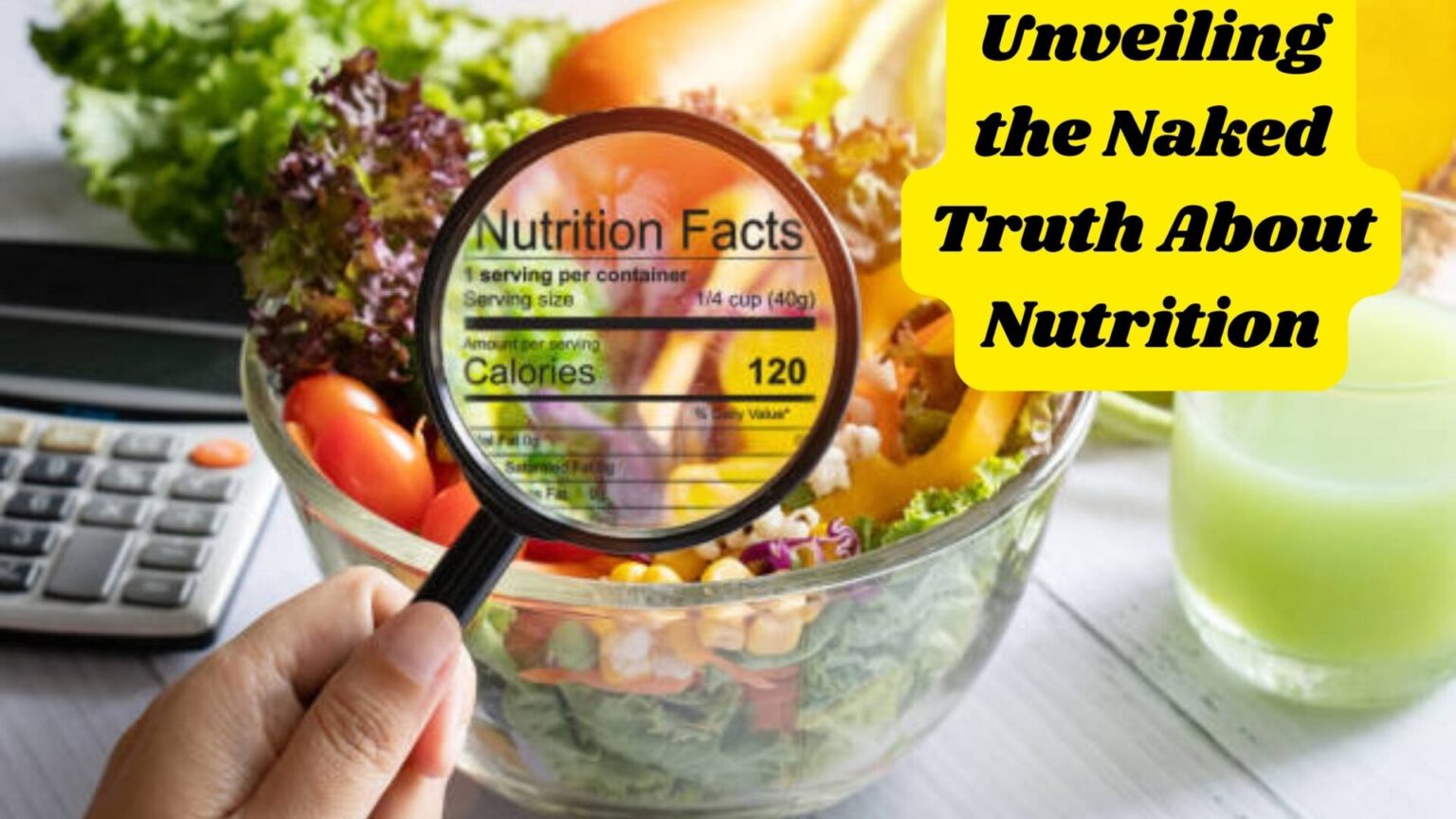Introduction
Unveiling the Naked Truth About Nutrition: Debunking Common Myths

In a world flooded with conflicting nutrition information, it’s easy to feel overwhelmed and confused about what constitutes a healthy diet. From fad diets to trendy superfoods, separating fact from fiction can seem like an impossible task. However, by stripping away the layers of misinformation, we can uncover the naked truth about nutrition and debunk some of the most common myths that plague the industry.
What are the most common Truth About Nutrition?”
Nutrition myths can be pervasive and misleading. Here are some of the most common ones:
- Carbs are bad for you: Carbohydrates are essential for providing energy to your body. The key is to choose complex carbohydrates like whole grains, fruits, and vegetables over simple carbs like sugary snacks and refined grains.
- Fat-free foods are always healthy: While reducing saturated and trans fats is beneficial, some fat is essential for your body to function properly. Healthy fats, like those found in nuts, avocados, and olive oil, are important for heart health and nutrient absorption.
- Eating late at night makes you gain weight: Weight gain is more about the total amount and type of food consumed rather than the time it’s eaten. However, eating a heavy meal right before bed can disrupt sleep and digestion for some people.
- Skipping meals helps with weight loss: Skipping meals can lead to overeating later in the day and may negatively affect your metabolism. Eating balanced meals and snacks throughout the day can help regulate hunger and prevent overeating.
- Eggs are bad for your heart: While eggs are high in cholesterol, dietary cholesterol has less of an impact on blood cholesterol levels than previously thought. For most people, moderate egg consumption can be part of a healthy diet.
- You need to detox with juice cleanses or detox diets: Your body has its own natural detoxification system involving the liver, kidneys, and other organs. Cleanses and detox diets are often low in essential nutrients and can be harmful if done for an extended period.
- All calories are equal: While calorie intake is important for weight management, the source of those calories matters. Nutrient-dense foods like fruits, vegetables, and lean proteins provide more essential nutrients and are more satisfying than empty-calorie foods like sugary snacks.
- Low-fat or diet products are always better for weight loss: Many low-fat or diet products contain added sugars or artificial ingredients to compensate for the reduced fat content, which can be less healthy than their full-fat counterparts.
- You can’t build muscle on a plant-based diet: With proper planning and attention to protein intake, it’s entirely possible to build muscle on a plant-based diet. Foods like beans, lentils, tofu, and quinoa can provide the necessary protein for muscle growth.
- All natural or organic foods are healthier: While organic foods may reduce exposure to pesticides and antibiotics, they’re not automatically healthier or more nutritious than conventionally grown foods. The most important thing is to focus on a balanced diet rich in fruits, vegetables, whole grains, and lean proteins, regardless of whether they’re organic or not.
“How can I spot false nutrition information online?”
Spotting false nutrition information online can be challenging, but here are some tips to help you navigate:

- Check the source: Look for information from reputable sources such as government health agencies, registered dietitians, academic institutions, and well-known health organizations. Be cautious of information from anonymous sources or websites with no clear credentials.
- Evaluate the credentials: Check the author’s credentials and expertise in nutrition. Registered dietitians (RD) and nutritionists with recognized certifications (e.g., Certified Nutrition Specialist, Certified Nutritionist) are generally reliable sources of information.
- Cross-reference information: Compare the information with other reputable sources to see if it aligns. If multiple credible sources provide similar information, it’s more likely to be accurate.
- Be wary of sensationalism: Be skeptical of sensational headlines or claims that seem too good to be true. Sensationalism is often used to grab attention but may lack scientific backing.
- Look for peer-reviewed studies: Scientific articles published in peer-reviewed journals undergo rigorous scrutiny by experts in the field. Look for references to peer-reviewed studies to support the claims made in the information.
- Question anecdotal evidence: Personal testimonials or anecdotes are not reliable evidence of effectiveness. Instead, look for evidence-based information supported by scientific research.
- Beware of pseudoscience: Watch out for pseudoscientific terms or claims that lack scientific evidence. Examples include detox diets, miracle foods, and claims of curing diseases with specific foods or supplements.
- Consider the context: Consider the context in which the information is presented. Is it promoting a specific product, diet, or agenda? Biased sources may present information in a way that supports their interests rather than providing objective facts.
- Consult multiple sources: Seek information from a variety of reputable sources to gain a well-rounded understanding of a topic. Avoid relying solely on one source, especially if it appears biased or lacks credibility.
- Trust your instincts: If something feels off or too good to be true, it’s worth investigating further. Trust your instincts and use critical thinking skills to evaluate the information you encounter online.
“Are there any hidden truths about nutrition?”
Nutrition is a field filled with ongoing research and evolving understanding, so there may be some aspects that aren’t widely known or understood. Here are a few examples:

- Individual Variability: While general guidelines exist, individual responses to food can vary widely due to factors like genetics, gut microbiome composition, and lifestyle. What works well for one person might not work the same for another.
- Nutrient Interactions: Nutrients often interact with each other in complex ways. For instance, the absorption of certain vitamins and minerals can be enhanced or inhibited by the presence of other nutrients.
- Food Processing: The degree to which food is processed can significantly impact its nutritional value. Highly processed foods may lose important nutrients or contain added sugars, unhealthy fats, and additives.
- Impact of Cooking Methods: How food is cooked can alter its nutritional profile. For example, certain cooking methods may destroy heat-sensitive vitamins or produce harmful compounds.
- Psychological Factors: Our psychological state and relationship with food can influence how we metabolize and utilize nutrients. Stress, for instance, can affect digestion and nutrient absorption.
- Bioavailability: Not all nutrients in food are equally absorbed by the body. Factors such as the form of the nutrient, other substances present in the food, and individual differences can affect how much of a nutrient is actually utilized by the body.
- Long-Term Effects: Many studies focus on short-term effects of diet, but the long-term impacts of certain dietary patterns are still being elucidated. This includes effects on aging, cognitive function, and chronic disease risk.
Understanding these hidden truths can help individuals make more informed decisions about their diet and lifestyle. However, it’s important to approach nutrition with a balanced perspective, considering both scientific evidence and individual needs and preferences.
Conclusion:
Separating Fact from Fiction
In conclusion, navigating the complex landscape of nutrition can be challenging, but by uncovering the naked truth about what constitutes a healthy diet, we can make more informed choices about the foods we eat. By debunking common myths surrounding nutrition, we can empower ourselves to adopt sustainable eating habits that promote long-term health and vitality.
In the end, it’s important to approach nutrition with an open mind and a critical eye, seeking out evidence-based information and consulting with qualified professionals to guide our dietary decisions. By doing so, we can strip away the layers of misinformation and uncover the naked truth about nutrition, paving the way for a healthier future for ourselves and generations to come.
FAQs
Q: Is there a one-size-fits-all approach to nutrition?
A: No, every individual has unique dietary needs based on factors such as age, gender, activity level, and underlying health conditions. While certain dietary principles apply to everyone, the specifics of a healthy diet can vary greatly from person to person.
Q: Are all carbohydrates bad for you?
A: No, carbohydrates are an essential source of energy for our bodies. It’s important to focus on consuming complex carbohydrates found in whole grains, fruits, and vegetables, while limiting simple carbohydrates like refined sugars and white flour.
Q: Are all fats unhealthy?
A: No, not all fats are created equal. Healthy fats found in foods like avocados, nuts, seeds, and fatty fish are important for brain function, hormone production, and overall well-being.
Q: How much protein do I need, and where should I get it from?
A: The amount of protein needed varies depending on factors such as age, activity level, and overall health. Both animal and plant-based sources can provide ample amounts of protein, including meat, poultry, dairy, beans, lentils, tofu, and quinoa.
References
- Harvard T.H. Chan School of Public Health. (2022). “The Nutrition Source.” Retrieved from: https://www.hsph.harvard.edu/nutritionsource/
- Mayo Clinic. (2022). “Healthy Lifestyle: Nutrition and Healthy Eating.” Retrieved from: https://www.mayoclinic.org/healthy-lifestyle/nutrition-and-healthy-eating
- American Heart Association. (2022). “Healthy Eating.” Retrieved from: https://www.heart.org/en/healthy-living/healthy-eating
- National Institutes of Health. (2022). “Dietary Guidelines for Americans.” Retrieved from: https://www.dietaryguidelines.gov/
- Academy of Nutrition and Dietetics. (2022). “Eat Right.” Retrieved from: https://www.eatright.org/






